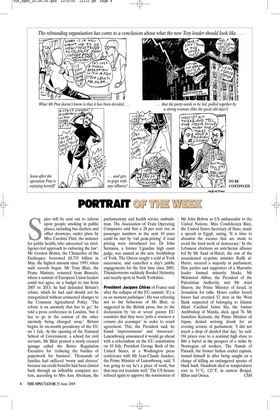PORTRAIT OF THE WEEK S pies will be sent out to
inform upon people smoking in public places, including bus shelters and office doorways, under plans by Miss Caroline Flint, the minister for public health, who advocated ‘an intelligence-led approach to enforcing the law’. Mr Gordon Brown, the Chancellor of the Exchequer, borrowed £8.735 billion in May, the highest amount since 1993, when such records began. Mr Tony Blair, the Prime Minister, returned from Brussels, where a summit of European Union leaders could not agree on a budget to run from 2007 to 2013; he had defended Britain’s rebate, which he had said should not be renegotiated without connected changes to the Common Agricultural Policy. ‘The rebate is an anomaly that has to go,’ he told a press conference in London, ‘but it has to go in the context of the other anomaly being changed away.’ Britain begins its six-month presidency of the EU on 1 July. At the opening of the National School of Government, a school for civil servants, Mr Blair praised a newly created quango called the Better Regulation Executive for ‘reducing the burden of paperwork for business’. Thousands of families had suffered ‘worry and distress’ because tax credit benefits had been clawed back through an inflexible computer system, according to Mrs Ann Abraham, the parliamentary and health service ombudsman. The Association of Train Operating Companies said that a 28 per cent rise in passenger numbers in the next 10 years could be met by ‘rail peak-pricing’ if road pricing were introduced too. Dr John Sentamu, a former Ugandan high court judge, was named as the new Archbishop of York. The Queen caught a cold at York racecourse, and cancelled a day’s public engagements for the first time since 2003. Thunderstorms suddenly flooded Helmsley and nearby spots in North Yorkshire.
President Jacques Chirac of France said after the collapse of the EU summit: ‘Il y a eu un moment pathétique’. He was referring not to the behaviour of Mr Blair, as suggested in the British press, but to the declaration by ‘six or seven’ poorer EU countries that they were ‘prêts à renoncer à certains des avantages’ in order to reach agreement. This, the President said, he found ‘impressionnant’ and ‘émouvant’. Luxembourg announced it would go ahead with a referendum on the EU constitution on 10 July. President George Bush of the United States, at a Washington press conference with Mr Jean-Claude Juncker, the Prime Minister of Luxembourg, said, ‘I was going to say he’s a piece of work, but that may not translate well.’ The US Senate refused again to approve the nomination of Mr John Bolton as US ambassador to the United Nations. Miss Condoleezza Rice, the United States Secretary of State, made a speech in Egypt, saying, ‘It is time to abandon the excuses that are made to avoid the hard work of democracy.’ In the Lebanese elections an anti-Syrian alliance led by Mr Saad al-Hariri, the son of the assassinated ex-prime minister Rafik alHariri, secured a majority in parliament; Shia parties and supporters of a Maronite leader formed minority blocks. Mr Mahmood Abbas, the President of the Palestinian Authority, met Mr Ariel Sharon, the Prime Minister of Israel, in Jerusalem for talks. Hours earlier Israeli forces had arrested 52 men in the West Bank suspected of belonging to Islamic Jihad. Cardinal Jaime Sin, the former Archbishop of Manila, died, aged 76. Mr Junichiro Koizumi, the Prime Minister of Japan, denied arriving drunk for an evening session of parliament; ‘I did not touch a drop of alcohol that day,’ he said. Oil prices rose to a nominal high close to $60 a barrel at the prospect of a strike by Norwegian oil workers. The Nawab of Pataudi, the former Indian cricket captain, turned himself in after being sought on a charge of killing an endangered species of black buck. Hundreds died as temperatures rose to 51°C, 123°F, in eastern Bengal, Bihar and Orissa. CSH


































































 Previous page
Previous page